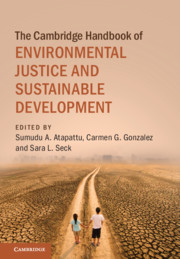Book contents
- The Cambridge Handbook of Environmental Justice and Sustainable Development
- The Cambridge Handbook of Environmental Justice and Sustainable Development
- Copyright page
- Contents
- Contributors
- Acknowledgments
- Foreword (on Living in an Interregnum)
- 1 Intersections of Environmental Justice and Sustainable Development
- Part I Frameworks
- Part II Case Studies
- Strategies, Challenges, and Vulnerable Groups
- 9 The Role of Public Interest Litigation in Realizing Environmental Justice in South Asia
- 10 Children’s Rights or Intergenerational Equity?
- 11 Indigenous Environmental Rights and Sustainable Development
- 12 Indigenous Ancestors
- 13 Water Justice and the Social Pillar of Sustainable Development
- 14 Gender, Indigeneity, and the Search for Environmental Justice in Postcolonial Africa
- 15 Colombo International Financial City
- Toxic Substances and Hazardous Wastes
- Resource Extraction
- Energy
- Climate Change
- Part III Conclusion
- Index
14 - Gender, Indigeneity, and the Search for Environmental Justice in Postcolonial Africa
from Strategies, Challenges, and Vulnerable Groups
Published online by Cambridge University Press: 26 March 2021
- The Cambridge Handbook of Environmental Justice and Sustainable Development
- The Cambridge Handbook of Environmental Justice and Sustainable Development
- Copyright page
- Contents
- Contributors
- Acknowledgments
- Foreword (on Living in an Interregnum)
- 1 Intersections of Environmental Justice and Sustainable Development
- Part I Frameworks
- Part II Case Studies
- Strategies, Challenges, and Vulnerable Groups
- 9 The Role of Public Interest Litigation in Realizing Environmental Justice in South Asia
- 10 Children’s Rights or Intergenerational Equity?
- 11 Indigenous Environmental Rights and Sustainable Development
- 12 Indigenous Ancestors
- 13 Water Justice and the Social Pillar of Sustainable Development
- 14 Gender, Indigeneity, and the Search for Environmental Justice in Postcolonial Africa
- 15 Colombo International Financial City
- Toxic Substances and Hazardous Wastes
- Resource Extraction
- Energy
- Climate Change
- Part III Conclusion
- Index
Summary
This chapter examines legal and governance innovations for advancing gender equality in environmental decision-making processes in postcolonial Africa. First, it evaluates how inequitable colonial, cultural, legal, social, and power relationships continue to create interlocking structures of gender-based ecological vulnerabilities in Africa, paying specific attention to Nigeria as a case study. It then discusses the need for a human rights–based gender framework as a policy tool for addressing gender-based environmental inequalities in Africa.
- Type
- Chapter
- Information
- Publisher: Cambridge University PressPrint publication year: 2021
- 3
- Cited by

